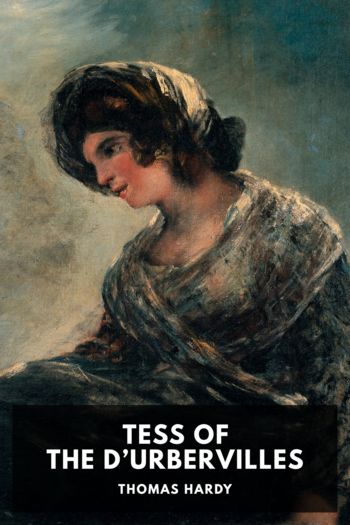Tess of the d’Urbervilles - Thomas Hardy (best color ereader .txt) 📗

- Author: Thomas Hardy
Book online «Tess of the d’Urbervilles - Thomas Hardy (best color ereader .txt) 📗». Author Thomas Hardy
This evening, night, and morning were passed precisely as the preceding ones had been passed. On one, and only one, occasion did she—the formerly free and independent Tess—venture to make any advances. It was on the third occasion of his starting after a meal to go out to the flour-mill. As he was leaving the table he said “Goodbye,” and she replied in the same words, at the same time inclining her mouth in the way of his. He did not avail himself of the invitation, saying, as he turned hastily aside—
“I shall be home punctually.”
Tess shrank into herself as if she had been struck. Often enough had he tried to reach those lips against her consent—often had he said gaily that her mouth and breath tasted of the butter and eggs and milk and honey on which she mainly lived, that he drew sustenance from them, and other follies of that sort. But he did not care for them now. He observed her sudden shrinking, and said gently—
“You know, I have to think of a course. It was imperative that we should stay together a little while, to avoid the scandal to you that would have resulted from our immediate parting. But you must see it is only for form’s sake.”
“Yes,” said Tess absently.
He went out, and on his way to the mill stood still, and wished for a moment that he had responded yet more kindly, and kissed her once at least.
Thus they lived through this despairing day or two; in the same house, truly; but more widely apart than before they were lovers. It was evident to her that he was, as he had said, living with paralyzed activities in his endeavour to think of a plan of procedure. She was awestricken to discover such determination under such apparent flexibility. His consistency was, indeed, too cruel. She no longer expected forgiveness now. More than once she thought of going away from him during his absence at the mill; but she feared that this, instead of benefiting him, might be the means of hampering and humiliating him yet more if it should become known.
Meanwhile Clare was meditating, verily. His thought had been unsuspended; he was becoming ill with thinking; eaten out with thinking, withered by thinking; scourged out of all his former pulsating, flexuous domesticity. He walked about saying to himself, “What’s to be done—what’s to be done?” and by chance she overheard him. It caused her to break the reserve about their future which had hitherto prevailed.
“I suppose—you are not going to live with me—long, are you, Angel?” she asked, the sunk corners of her mouth betraying how purely mechanical were the means by which she retained that expression of chastened calm upon her face.
“I cannot,” he said, “without despising myself, and what is worse, perhaps, despising you. I mean, of course, cannot live with you in the ordinary sense. At present, whatever I feel, I do not despise you. And, let me speak plainly, or you may not see all my difficulties. How can we live together while that man lives?—he being your husband in nature, and not I. If he were dead it might be different … Besides, that’s not all the difficulty; it lies in another consideration—one bearing upon the future of other people than ourselves. Think of years to come, and children being born to us, and this past matter getting known—for it must get known. There is not an uttermost part of the earth but somebody comes from it or goes to it from elsewhere. Well, think of wretches of our flesh and blood growing up under a taunt which they will gradually get to feel the full force of with their expanding years. What an awakening for them! What a prospect! Can you honestly say ‘Remain’ after contemplating this contingency? Don’t you think we had better endure the ills we have than fly to others?”
Her eyelids, weighted with trouble, continued drooping as before.
“I cannot say ‘Remain,’ ” she answered, “I cannot; I had not thought so far.”
Tess’s feminine hope—shall we confess it?—had been so obstinately recuperative as to revive in her surreptitious visions of a domiciliary intimacy continued long enough to break down his coldness even against his judgement. Though unsophisticated in the usual sense, she was not incomplete; and it would have denoted deficiency of womanhood if she had not instinctively known what an argument lies in propinquity. Nothing else would serve her, she knew, if this failed. It was wrong to hope in what was of the nature of strategy, she said to herself: yet that sort of hope she could not extinguish. His last representation had now been made, and it was, as she said, a new view. She had truly never thought so far as that, and his lucid picture of possible offspring who would scorn her was one that brought deadly convictions to an honest heart which was humanitarian to its centre. Sheer experience had already taught her that in some circumstances there was one thing better than to lead a good life, and that was to be saved from leading any life whatever. Like all who have been previsioned by suffering, she could, in the words of M. Sully-Prudhomme, hear a penal sentence in the fiat, “You shall be born,” particularly if addressed to potential issue of hers.
Yet such is the vulpine slyness of Dame Nature, that, till now, Tess had been hoodwinked by her love for Clare into forgetting it might result in vitalizations that would inflict upon others what she had bewailed as misfortune to herself.
She therefore could not withstand his argument. But with the





Comments (0)